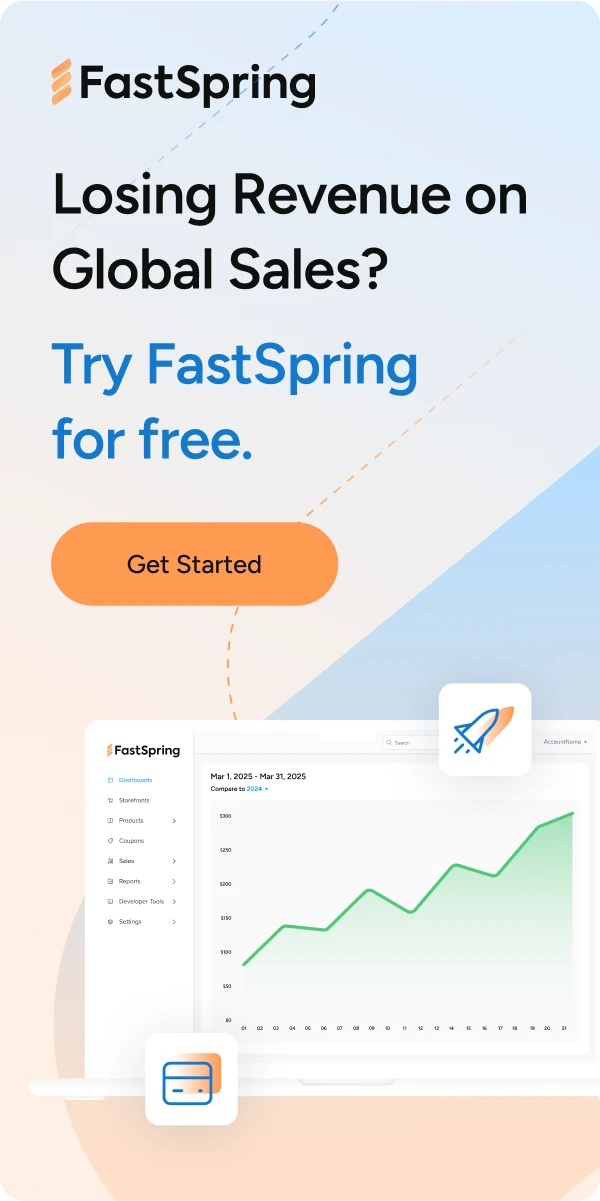In today’s digital-first economy, expanding into high-growth markets isn’t just an opportunity for global businesses — it’s a necessity. In recent years, digital economies have grown exponentially across Asia, Latin America, the Middle East, and Africa, and the sheer market size makes these geographies impossible to ignore.
So, what can digital goods companies do to break into these markets effectively?
Supporting country-specific debit networks, mobile wallets, and bank transfer schemes gives buyers seamless and trusted payment options. In turn, businesses gain access to the entire global market, boosting conversion and revenue along the way.
But don’t take our word for it; the results from a Baymard study speak for themselves:
- Businesses that enable regionally preferred payment methods see 21% higher growth rates than those that don’t.
- Websites that localize pricing twice the conversion rate of those that do not.
- 76% of shoppers prefer sites that display pricing in their home currency, which directly impacts buying decisions.
Global Payments: One Size Doesn’t Fit All
While credit cards are the default in most Western markets, they are far from the norm in high-growth regions like India, Brazil, and Asia-Pacific. In these markets, the rise of mobile-first economies has fundamentally changed how consumers pay for goods and services.
Take India, for example. With over 700 million Internet users and counting according to a Nielsen study, India has leapfrogged traditional banking models in favor of mobile-driven financial services. Credit card penetration remains strikingly low — fewer than 5% of Indians own a credit card according to Times of India — due to strict banking requirements, limited access to credit, and a consumer preference for real-time, bank-linked transactions.
Instead, UPI (Unified Payments Interface) has become the dominant force, processing over 75% of all digital retail transactions. UPI’s success is primarily due to its seamless, mobile-first experience, allowing users to make instant payments via mobile apps like Google Pay and Apple Pay without requiring a credit card.
For businesses looking to capture the Indian market, supporting UPI has become a requirement.
The shift away from credit cards isn’t unique to India. Digital payments have also taken center stage in Brazil, with Pix emerging as the country’s most-used payment method. Launched by the Central Bank of Brazil, Pix now has 153 million users and has been adopted by 68% of mobile wallet users in the country. The appeal? Instant, fee-free transactions that work 24/7.
For businesses selling in Brazil, integrating Pix is critical to reaching the majority of digital consumers who prefer bank transfers over traditional card payments.
Beyond Pix, Brazil’s payment ecosystem also relies heavily on local card networks like Elo and Hipercard, which serve a broad consumer base and can be offered only if you have local acquiring. Elo is the third-largest card scheme in the country, while Hipercard remains widely used, particularly among lower-income consumers who may not have access to international credit cards. Companies that fail to support these preferred payment methods risk high cart abandonment rates and lost revenue.
A Merchant of Record Handles Local Payment Methods for You
Partnering with a merchant of record (MoR) with a focus on the right local payment methods opens up emerging markets to companies looking for growth. With FastSpring, companies gain instant access to these key benefits:
- Local Acquiring and Card Schemes:
- Higher Conversion Rate: Get improved transaction success rates, due to local acquiring.
- Access to additional market share: Around 20% of Brazilian customers use local cards like ELO.
As global digital commerce expands, one-size-fits-all payment strategies no longer work. Businesses that fail to tailor their payment options to match consumer behavior in these high-growth regions will struggle to scale.
By integrating UPI in India, local cards in Brazil, and other country-specific payment methods around the globe, companies can unlock new revenue streams, improve conversion rates, and build trust with their global customer base.
FastSpring’s Expanded Local Payment Support
At FastSpring, we know that seamless transactions drive conversion and revenue. However, not all payment methods drive the same results in every market. That’s why we take a data-driven, market-specific approach to expanding our global payment capabilities. We focus on methods that improve approval rates and cross-border transaction successes by aligning our strategy with how customers in each region prefer to pay.
Our goal is simple: to give you the payment methods that generate meaningful revenue. To do this, we continuously analyze payment data, market trends, and consumer behaviors to identify where demand is shifting. That’s why we’ve expanded our support to include:
- UPI in India: Meeting the needs of a mobile-first economy where credit cards are rare and real-time, bank-based payments dominate.
- Pix and Brazilian Local Cards (Elo & Hipercard): Unlocking Brazil’s vast digital economy by supporting the most widely used bank-transfer system (Pix) alongside local card networks.
- New Taiwanese Dollar (TWD) Currency Support: Expanding cross-border sales potential in Taiwan’s growing digital economy.
But we don’t stop at just adding payment options — we go one step deeper.
We collaborate with our payment partners to understand the nuances of different industries and how customer preferences vary even within the same country.
While Konbini is Japan’s most commonly used payment method, gaming customers overwhelmingly prefer PayPay. The same applies in South Korea, where Toss has gained more traction in gaming than Naverpay. By tailoring our offerings based on real-world payment behavior, we help businesses maximize approval rates, reduce friction at checkout, and drive higher conversions.
Expanding global sales isn’t just about accepting more payment methods — it’s about accepting the right ones. With FastSpring, you get a partner that helps your business position itself for success in the world’s fastest-growing digital markets.
Trusted Payment Methods Reduce Friction
Beyond our expanded payment support, FastSpring continues to provide comprehensive payment solutions that cater to global businesses:
- Automatic Currency and Payment Method Localization: Our system dynamically presents customers with the most relevant payment methods and currencies based on their location, increasing trust and conversion rates.
- Expansive Support for Global Currencies and Payment Methods: This includes AliPay, Pix, WeChat Pay, Google Pay, Apple Pay, and more, ensuring businesses can process payments seamlessly in high-growth regions.
- Data-Driven Optimization: FastSpring analyzes payment trends to continually refine and expand its payment offerings, helping businesses stay ahead of market demands.
By providing trusted payment methods, reducing friction, and delivering a localized experience, businesses can enhance customer confidence, streamline transactions, and foster brand loyalty.
Go Global With FastSpring
Expanding into new markets doesn’t have to be complex. With FastSpring’s expanded payment capabilities, you can offer the right payment methods at the right time to tap into high-growth economies, reduce cart abandonment, and increase revenue.
Ready to maximize your global reach?
Partner with FastSpring and make every transaction count.








